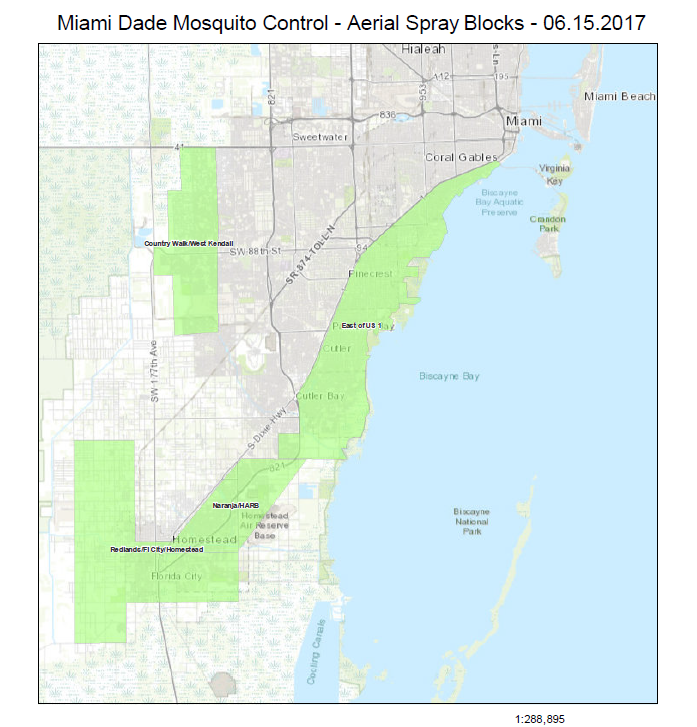
via Miami-Dade County

Audio By Carbonatix
Update: The county rescheduled its spraying mission to 8 p.m. Friday, June 16, due to inclement weather Thursday.
(2/2) Tonight's cancelled aerial spraying will be rescheduled to take place tomorrow 6/16, weather permitting
— Miami-Dade SWM (@miamidadeswm) June 16, 2017
Original Post:
This year’s mosquito season is shaping up to be a doozy already: Black salt marsh mosquitoes, which do not carry tropical diseases like the Zika virus or Dengue fever, arrived a few weeks earlier than usual. The bugs swarm in clouds thick enough to suffocate livestock, and Dade Mosquito Control says its traps are swelling with insects. Local residents are flooding 311 with complaints about the pests.
In response, the county tried to spray naled, the controversial pesticide that sparked protests last year, over huge swaths of south Miami-Dade County. Last month, it was too windy to spray from planes, but tonight, the county plans to waft naled through the air yet again — over an even bigger portion of Miami-Dade starting at 8 p.m., weather-permitting. (Importantly, no cases of the Zika virus have been reported.)
“The aerial treatment is in response to mosquito surveillance data and a high volume of calls to 311 reporting nuisance mosquito activity,” Mosquito Control Spokesperson Francisco Calderon wrote in a press release.
Tonight, portions of Cutler Bay, Pinecrest, South Miami, Homestead, and Florida City will get the fog:

via Miami-Dade County
Though the county regularly says that naled has been “used safely by Miami-Dade Mosquito Control for decades,” there are reams of evidence to show that statement isn’t entirely true. Before being sprayed over Miami last year, naled was almost exclusively sprayed over Florida crop fields. State farmorkers exposed to the family of pesticides that naled belongs to, called “organophosphates,” have been shown to have issues with vision and fine motor skills the longer they were exposed to organophosphate-laced crops.
Another major study released last week confirmed yet again that trace amounts of naled likely harm children. A massive study published in the peer-reviewed journal Environment International last Thursday showed that babies exposed to naled developed motor-skill issues roughly nine months after being born.
While the pesticide is legal for use in the United States, it has been banned throughout the European Union for years, as regulators there claimed it posed an “unacceptable risk” to human and animal health.
There is also evidence to show that Miami-Dade County Mosquito Control has not exactly been careful with the chemicals it sprays over populated areas. A New Times investigation published yesterday showed that the county failed to test which pesticides worked on Dade’s Aedes aegypti mosquitoes before starting to spray last year.
As a result, the county sprayed permethrin — the active ingredient in Raid — over Wynwood and Miami Beach, only for the insecticide to have no effect. A subsequent test conducted in October showed that the mosquitoes had been mostly resistant to permethrin the entire time. However, a Penn State study released last week linked aerial permethrin use to increased autism rates in children — suggesting that while the county did not harm many mosquitoes, it might have hurt human beings instead.
In fact, local mosquitoes have become so resistant to the entire family of pesticides that permethrin belongs to — called “pyrethroids” — that the county told New Times yesterday it’s moving away from the group entirely when it comes to Zika-fighting. Instead, the county will use malathion, an old organophosphate pesticide that environmentalists have also long complained about.
There are concerns, of course, that using naled repeatedly to kill black salt marsh mosquitoes could also force Zika-carrying aedes aegypti mosquitoes to build up resistance to the toxin.
While the county does not typically warn civilians to take precautions before aerial spraying missions, a scientist with the National Resources Defense Council told New Times that people living in impacted areas should take children’s and pet toys inside, close their windows, and wipe down any outdoor play equipment or lawn ornaments after the spraying stops. And, of course, don’t stand right under the planes and breathe in the fumes.
Mayor Carlos Gimenez’s office said the county will take a tally of emails regarding naled spraying sent to dswm@miamidade.gov.